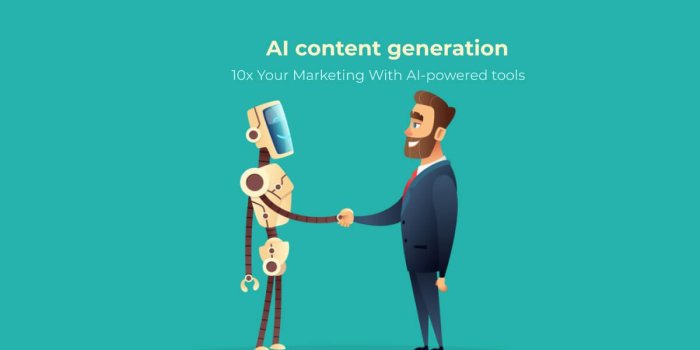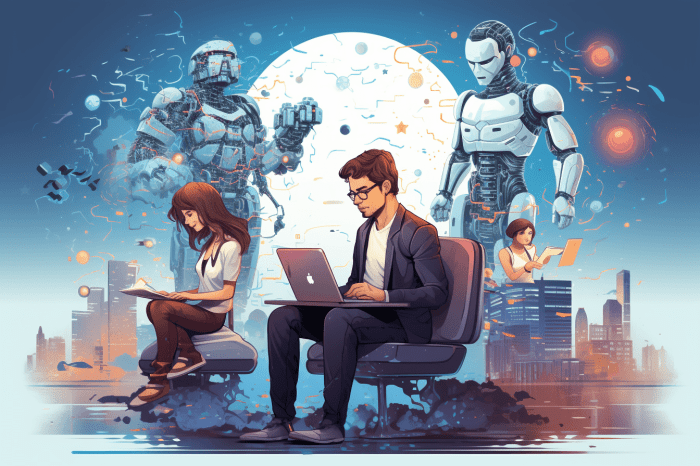Kicking off with Using AI for Content Creation, this topic delves into the cutting-edge technology shaping the content creation landscape. From generating written and visual content to optimizing for , AI is at the forefront of innovation.
As we explore the role of AI in content creation, we uncover its benefits, challenges, and future trends that are set to redefine how we create and consume content.
Introduction to AI for Content Creation

Artificial Intelligence (AI) in the realm of content creation refers to the use of advanced algorithms and machine learning techniques to generate, curate, and optimize various forms of content. This includes but is not limited to articles, videos, social media posts, and even music compositions.
AI has significantly impacted the content creation landscape by streamlining processes, increasing efficiency, and enhancing creativity. It has enabled content creators to automate repetitive tasks, analyze data to understand audience preferences, and generate personalized content at scale.
AI in Various Industries for Content Creation
- Marketing: AI is used to create targeted advertisements, personalized email campaigns, and optimize content for search engines.
- Film and TV: AI algorithms are employed to analyze scripts, predict box office success, and even generate film trailers.
- Music: AI systems are utilized to compose music, create personalized playlists, and even produce entire albums.
- Gaming: AI is integrated to generate game levels, design characters, and enhance player experiences through dynamic content creation.
Applications of AI in Content Creation
AI tools have revolutionized the way content is created across various platforms. From generating written content to creating visual elements, AI plays a crucial role in optimizing content for better engagement and .
Generating Written Content
AI tools can generate written content such as articles, blogs, and social media posts by analyzing vast amounts of data and producing human-like text. These tools use natural language processing algorithms to understand context, tone, and style, making the content creation process faster and more efficient.
- AI-powered writing assistants like Grammarly and Copy.ai help writers enhance their content by providing suggestions for grammar, tone, and structure.
- Content creation platforms like GPT-3 can generate blog posts, product descriptions, and even poetry based on the input provided by users.
- Social media management tools like Buffer and Hootsuite use AI to suggest post captions, hashtags, and posting times for better engagement.
Creating Visual Content
AI is also used to create visual content like images, videos, and graphics by analyzing data patterns and user preferences. These tools can assist in designing visually appealing content that resonates with the target audience.
- AI-powered design tools like Canva and Adobe Sensei help users create professional-looking graphics, logos, and marketing materials without the need for graphic design skills.
- Video editing software like Magisto and Lumen5 use AI algorithms to automatically edit videos, add effects, and create engaging visual content for social media and websites.
- Image recognition technology enables AI to generate personalized images and visual content based on user preferences and behavior, enhancing the overall user experience.
Optimizing Content for and Engagement
AI plays a crucial role in optimizing content for search engines and improving engagement by analyzing data, user behavior, and market trends to deliver personalized and relevant content to the audience.
- tools like SEMrush and Moz use AI algorithms to analyze s, backlinks, and content performance to improve website ranking and visibility on search engine results pages.
- Content recommendation engines like Taboola and Outbrain use AI to suggest personalized content to users based on their interests, browsing history, and engagement patterns, increasing user interaction and retention.
- Social media analytics tools like Sprout Social and Brandwatch leverage AI to track engagement metrics, monitor brand mentions, and analyze social media trends to optimize content strategy and improve audience engagement.
Benefits of Using AI for Content Creation
AI has revolutionized the way content is created, offering numerous benefits that can greatly enhance the overall content production process.
Scaling Content Production
AI allows for the automation of various content creation tasks, enabling organizations to scale their content production efforts efficiently. By leveraging AI-powered tools, businesses can generate a large volume of content in a fraction of the time it would take for human creators to do so manually.
Enhancing Content Quality and Consistency
One of the key advantages of using AI for content creation is its ability to improve the quality and consistency of the content produced. AI algorithms can analyze data, identify trends, and suggest relevant topics or s, ensuring that the content meets high standards and remains consistent across different pieces.
Cost-Effectiveness and Efficiency
AI-driven content creation is not only cost-effective but also highly efficient. By automating repetitive tasks such as research, data analysis, and even writing, organizations can significantly reduce the time and resources required to produce high-quality content. This results in cost savings and increased productivity, making AI a valuable asset for content creators.
Challenges and Limitations of AI in Content Creation

AI in content creation brings along its own set of challenges and limitations that need to be carefully considered to ensure the quality and authenticity of the content being produced.
Potential Challenges in Using AI for Content Creation
- Accuracy: AI algorithms may not always produce accurate content, leading to errors and misinformation if not properly monitored and adjusted.
- Originality: AI-generated content can sometimes lack originality and creativity, resulting in generic or repetitive output.
Ethical Considerations Surrounding AI-Generated Content
- Plagiarism: AI tools can inadvertently generate content that is similar to existing works, raising concerns about plagiarism and intellectual property rights.
- Bias: The data used to train AI models may contain biases that can be reflected in the generated content, perpetuating stereotypes or misinformation.
Limitations of AI Tools in Understanding Context and Creativity, Using AI for Content Creation
- Contextual Understanding: AI may struggle to grasp the nuanced context of certain topics or languages, leading to inaccuracies or misinterpretations in the content.
- Creativity: While AI can mimic human creativity to some extent, it may lack the intuition and emotional intelligence required for truly innovative and engaging content creation.
Future Trends in AI for Content Creation: Using AI For Content Creation
AI technologies are rapidly evolving to meet the changing demands of content creators. As we look towards the future, it is important to consider the potential impact of AI on the future of content marketing and storytelling. Emerging AI tools and techniques are poised to shape the landscape of content creation in exciting new ways.
Enhanced Personalization
AI is expected to revolutionize content creation by enabling enhanced personalization. With the ability to analyze vast amounts of data, AI can generate hyper-personalized content tailored to the preferences and behaviors of individual users. This level of customization has the potential to significantly improve user engagement and drive conversions.
Automated Content Generation
One of the most notable trends in AI for content creation is the rise of automated content generation. AI-powered tools can now generate written content, videos, and even visual designs with minimal human intervention. This automation streamlines the content creation process, allowing creators to focus on higher-level tasks while AI handles the heavy lifting.
Interactive Content Experiences
AI-powered technologies are paving the way for more interactive content experiences. Chatbots, virtual assistants, and interactive storytelling platforms are becoming increasingly popular, offering users immersive and engaging content experiences. These interactive elements not only captivate audiences but also gather valuable insights for creators to optimize their content strategies.
Real-time Content Optimization
AI is enabling real-time content optimization by analyzing user behavior and preferences instantaneously. Content creators can leverage AI algorithms to A/B test different variations of content in real-time, allowing them to optimize for maximum impact. This data-driven approach ensures that content remains relevant and resonates with the target audience.
Ethical Considerations
As AI continues to advance in content creation, ethical considerations become increasingly important. Issues such as bias in AI-generated content, data privacy, and transparency in AI algorithms must be addressed to ensure responsible and ethical use of AI in content creation.